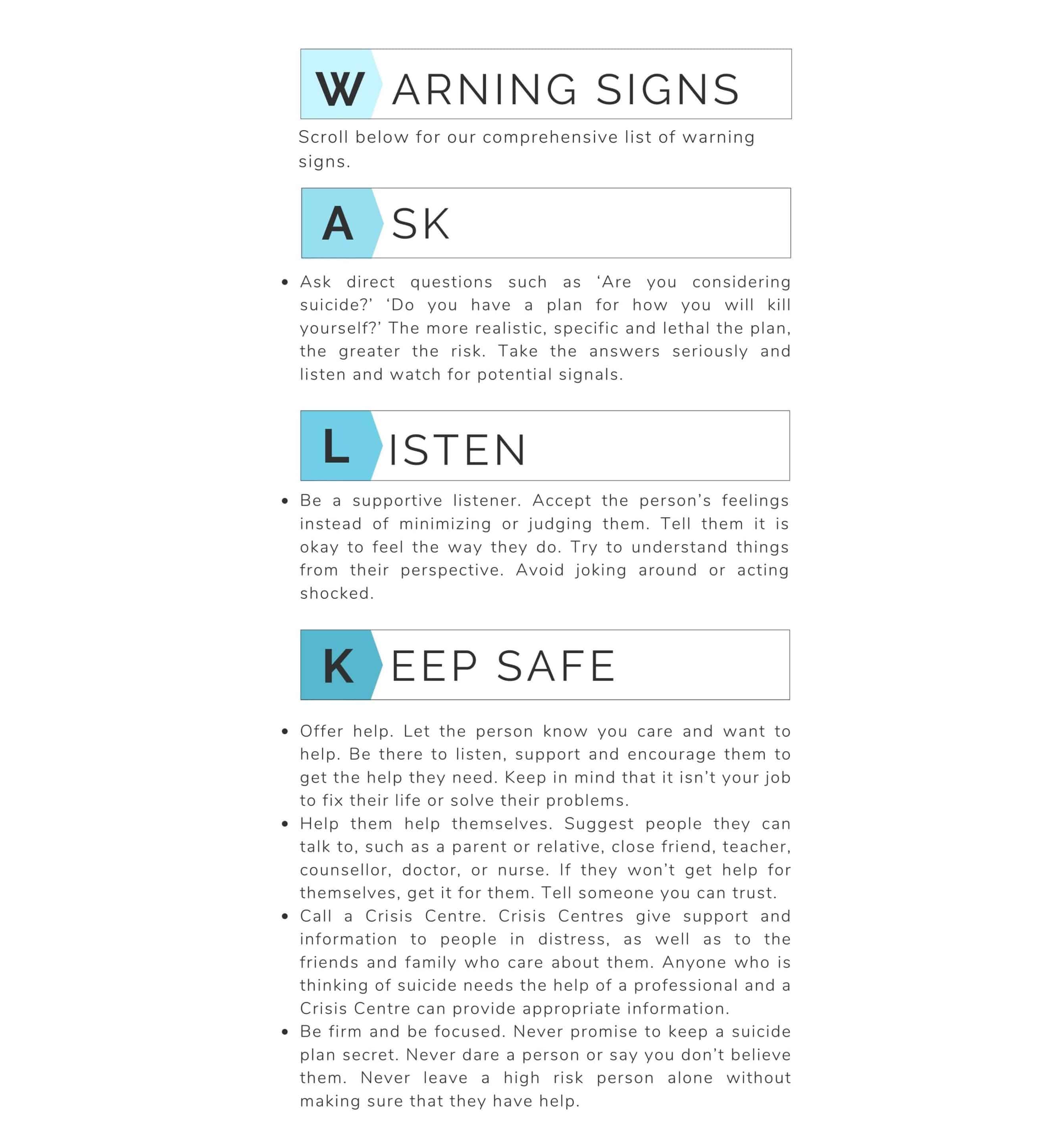We are here to listen, here to help - Any time.
If you or someone you know is having thoughts of suicide, call 1-800-784-2433 (1-800-SUICIDE).
Recognizing When Someone May Be Thinking About Suicide
Suicide is serious and if you know someone who you believe may be thinking about suicide, the following information can be helpful. Please remember that if you are supporting someone with thoughts of suicide, you must take care of yourself as well.
Talking to someone about suicide can be scary. WALK is a simple acronym that can help you take steps to open up the conversation.

Some significant losses to look for
-
-
-
-
-
-
-
-
-
- Death of a loved one, especially by suicide
- A key relationship unraveling or ending
- Instability/turmoil at home/in one’s family
- A severe change in social status or a sense of belonging
- Unemployment, loss of a highly valued ability or activity
- Fear of disciplinary action/incarceration/physical violence
- Trauma from sexual or other assault
- Trauma from serious illness or injury
- Major financial/economic loss
-
-
-
-
-
-
-
-
Some attitudes to look for
-
-
-
-
-
-
-
-
-
- Depression: Nothing seems important anymore. Life’s a bad joke.
- Hopelessness/helplessness: There is nothing I can do to change this.
- Purposelessness: There is nothing to live for; there is no point to anything.
- Worthlessness: I can’t do anything right. No one cares if I live or die.
- Overwhelmed: I can’t stand this anymore. This is way too much for me.
- Intense worry/anxiety: Everything is falling apart. Everyone is going to be disappointed in me.
- Recklessness/impulsiveness: I don’t care if I break my neck.
- Elation: Everything is perfect now! (suddenly, after someone has been in a lot of distress)
-
-
-
-
-
-
-
-
Some behaviours to watch for
-
-
-
-
-
-
-
-
-
- Negative social media posts
- Increased use of drugs or alcohol
- Withdrawal/isolation from once enjoyable people/activities
- Risky impulsive activities
- Aggressive, violent behaviour; rage/revengeful acts
- Decreased or increased performance (school, work, hobbies, sports)
- Self-neglect (appearance or hygiene)
- Extreme mood swings
- Changes in energy level (up or down)
- Complaints about health
- Difficulty concentrating
- Decreased, increased or otherwise disturbed eating and/or sleeping
-
-
-
-
-
-
-
-
Additional Indicators Strongly Associated With Suicidality
Preparation for Death
-
-
-
-
-
-
-
-
-
- Giving away prized possessions, making a will, settling loose end
- Saying goodbye or talking about going away unexpectedly, or with a sense of finality
-
-
-
-
-
-
-
-
Talking about suicide, death or dying
-
-
-
-
-
-
-
-
-
- Saying things such as ‘Life isn’t worth it…’ or ‘Things would be better if I was gone…’
- Making jokes, poems, drawings or other references to suicide, death or dying
- Sharing/expressing morbid fantasy or plans about dying or death
-
-
-
-
-
-
-
-
Previous unresolved or recent suicide behaviour
Youth Support Line
250-564-8336 (text)
1-888-564-8336
A confidential peer support service operated by trained youth answering calls from other youth. Text from 4-10PM or call 24/7.
310Mental Health Line
310-6789
For emotional support, information and resources specific to mental health.
24-Hour Crisis Line
250-563-1214
1-888-562-1214
A confidential and non-judgmental crisis line to discuss anything troubling you. If it is a crisis to you, it is a crisis to us.
1-800-SUICIDE
1-800-784-2433
If you are considering suicide or are concerned about someone who may be.




